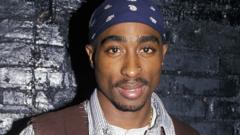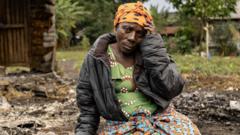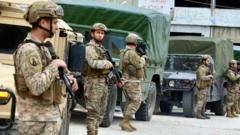In a deep dive into hip-hop history, we unveil Quincy Jones' attempt to mediate peace during a period marked by violence and rivalry, revealing the complexities of artists, media, and the music industry's cultural landscape.
**The Unseen Summit: Quincy Jones' Secret Gathering to Pave Peace in Hip-Hop's Divisive Era**

**The Unseen Summit: Quincy Jones' Secret Gathering to Pave Peace in Hip-Hop's Divisive Era**
Explore the pivotal yet concealed summit led by Quincy Jones to address the escalating rap conflicts of the 90s.
Before the tragic deaths of Tupac Shakur and The Notorious B.I.G., a legendary music figure, Quincy Jones, sought to mitigate the rising tensions within hip-hop by orchestrating a clandestine summit. In the midst of the 1990s, as hip-hop surged into mainstream popularity, young artists found themselves navigating a perilous landscape rife with rivalries and violence. Jones, who had witnessed his share of hardships, recognized the need for dialogue and understanding among the emerging artists.
Jones' life experience reflected an evolution from a troubled youth in 1930s Chicago, where he faced gang violence and adversity, to becoming a monumental force in music history. His collaborations with acclaimed musicians like Ray Charles, Frank Sinatra, and Michael Jackson underscored his status. However, his role in the hip-hop realm has often remained overshadowed.
In 1995, amid the burgeoning East Coast-West Coast feud, Jones summoned influential artists and executives for a secret meeting, hoping it would be a turning point. The summit aimed to provide guidance to the new generation concerning the music industry while addressing the growing concerns over rap's public perception fueled by rivalry.
This gathering, moderated by Fab 5 Freddy—then a prominent figure at Yo! MTV Raps—was both symbolic and strategic. Jones intended to unify key personalities within the hip-hop community, encouraging them to put differences aside. The atmosphere was historically charged, with notable artists like Snoop Dogg, Sean Combs (P Diddy), and members of renowned groups like Public Enemy in attendance.
Despite Tupac being incarcerated at the time, his looming presence deeply influenced the summit's discussions. Jones saw an urgency in addressing the potentially destructive paths some artists were veering toward. He passionately communicated the severity of the situation, remarking on the dangers accompanying the lifestyle many rappers were portrayed to embrace.
Former National Security Advisor Colin Powell also participated in the unprecedented summit under strict confidentiality, a measure to protect his political aspirations amidst the turbulent backdrop of rap music. Discussions included contentious viewpoints, with Powell's military demeanor providing an unexpected balance among the artists present.
Reflecting on that gathering, many attendees acknowledged the weight of the historical moment they shared. However, despite Jones' hopeful intentions and the inspiring dialogue that transpired, the unavoidable reality was the growing darkness of animosity in hip-hop history. The violence ultimately culminated in the senseless murders of both Tupac and B.I.G., leaving lasting scars within the music community.
In retrospect, conversations at the summit highlighted the delicate dynamic of the music industry, driven by jealousy, media frenzy, and external influences that often manipulated public perceptions. Fab 5 Freddy emphasized how the tensions had often been exaggerated by media outlets, leading to tragic outcomes for artists.
Quincy Jones, even with his profound influence, could not redirect the course set by ingrained rivalries and pride. However, the summit stands as a vital chapter in hip-hop history—an episodic reminder of the importance of connection, understanding, and unity in an often-fractured community.






















